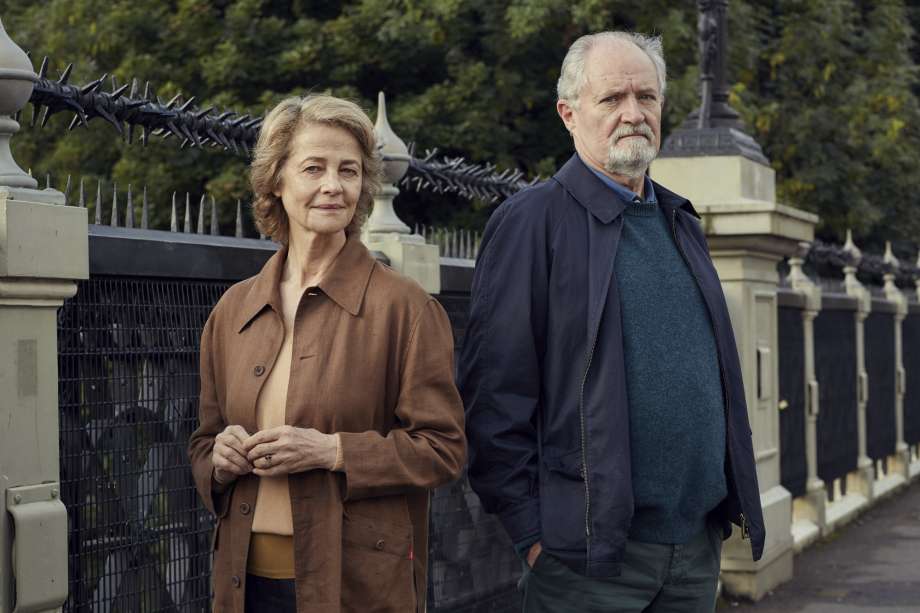
 Jim
Broadbent (Bridget Jones's Baby,
The Legend of Tarzan) gets a rare
starring role in a film, which might be reason enough to rejoice for
those who've enjoyed his many wonderful supporting character turns,
but, unfortunately, even his presence isn't enough to spark The
Sense of an Ending to life. He plays London divorcee and
retiree Tony Webster, who spends his days running a vintage camera
shop, who ends up resurrecting old feelings when he receives word
that, Sarah Ford (Mortimer, Hugo), the
mother of a girl he was seeing in his days at college during the
1960s, has died and has left him a diary, currently in the possession
of his ex-girlfriend, Veronica (Rampling, I
Anna), who doesn't want to hand over the item.
Jim
Broadbent (Bridget Jones's Baby,
The Legend of Tarzan) gets a rare
starring role in a film, which might be reason enough to rejoice for
those who've enjoyed his many wonderful supporting character turns,
but, unfortunately, even his presence isn't enough to spark The
Sense of an Ending to life. He plays London divorcee and
retiree Tony Webster, who spends his days running a vintage camera
shop, who ends up resurrecting old feelings when he receives word
that, Sarah Ford (Mortimer, Hugo), the
mother of a girl he was seeing in his days at college during the
1960s, has died and has left him a diary, currently in the possession
of his ex-girlfriend, Veronica (Rampling, I
Anna), who doesn't want to hand over the item.
The flashbacks are the main thrust of the film, framed by the
present-time retelling of the story between Tony and his ex-wife with
whom he is still on good terms, Margaret (Walter,
Star Wars: The Force Awakens), who
is mildly amused at seeing her husband go through the wringer of
emotions that reliving the events causes, but also mildly annoyed that
he never revealed any of these deep-rooted, emotional things while
they were together as husband and wife. As Tony begins to find
out more about what has happened to the friends he once had over forty
years ago, the more he realizes how much he assumed about them at the
time that has shaped his world view, which is now changing radically
with each new piece of information that comes out.
A Sense of an Ending is made by Indian director Ritesh Batra
(Masterchef, The Lunchbox), in his
first English-language effort, from a Nick Payne (Nora)
adaptation of a 2011 award-winning novel from Julian Barnes, laboring
from the cinema-unfriendly narrative structure involving a sit-down
conversation, followed by flashbacks of a story filled with details
that take too long to get to the relevant portions. The problem
isn't so much the direction and writing as much as it is an idea that
doesn't seem to translate very well into a feature film, as the
characters aren't particularly interesting to follow, and the nature
of what these characters do or have done to one another is even less
so. Only the theme on the human need to find closure in history,
both political and personal, and of how we can't really know what
caused an event unless documented in the moment, is something fresh,
but even then, it's not really worth an hour and forty-plus minutes to
explore to make its point, especially when the major reveals within
the film will inspire more yawns than gasps.
Although this is a fine collection of actors, there are casting
issues. The primary one is that it there is very little
resemblance between the older versions of the characters, played by
Broadbent and Charlotte Rampling (whose presence only reminds us of
how much better 45 Years handled a
similar plotline), with their younger representations, played by Billy
Howle (Fulfilment) and Freye Mavor (The
Lady in the Car with Glasses and a Gun), respectively.
It's difficult to resolve that we're watching the natural extension of
the characters when they look, act, and speak in manners entirely
different between the decades, taking us out of the story to observe
them separately, rather than as a seamless whole. There are also
needless ones, including a subplot involving Tony's pregnant daughter
(Dockery, Self/less)
about to give birth, presumably to showcase a beginning as part of an
ending in a film about beginnings and endings.
Unless you're someone captivated by Broadbent to the point where you
will enjoy anything he is in, there's not much about The Sense of
an Ending that I can recommend. Other than that, it's just a
collection of people you won't care about talking about things that
don't matter much, except to Tony, who is not remarkable enough to
register an impression upon us one way or another. It's not bad,
but it's boring and nearly weightless, making the act of watching
The Sense of an Ending not make much sense in
the end.
Qwipster's rating:







©2017 Vince Leo

 Jim
Broadbent (
Jim
Broadbent (